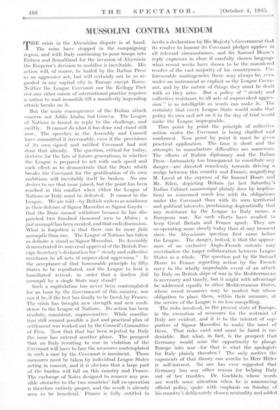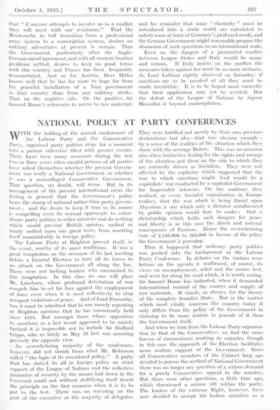MUSSOLINI CONTRA MUNDUM
THE crisis in the Abyssinian dispute is at hand. The rains have stopped in the campaigning region, and with Italy continuing to pour troops into Eritrea and Somaliland for the invasion of Abyssinia the Emperor's decision to mobilise is inevitable. His action will, of course, be hailed by the Italian Press as an aggressive act, but will certainly not be so re- garded in any capital city in Europe except Rome. Neither the League Covenant nor the Kellogg Pact nor any other canon of international practice requires a nation to wait immobile till a manifestly impending attack breaks on it.
But the main consequences of the Italian attack concern not Addis Ababa, but Geneva. The League of Nations is bound to reply to the challenge, and swiftly. It cannot do what it has done and stand still now. The speeches in the Assembly and Council have committed it irrevocably, even if the provisions of its own signed and ratified Covenant had not done that already. The question, critical for today, decisive for the fate of future generations, is whether the League is prepared to act with such speed and such effect as to demonstrate that the State which breaks the Covenant for the gratification of its own ambitions will inevitably itself be broken. No one desires to see that issue joined, but the point has been reached in this conflict when either the League of Nations or Italy must be defeated. It cannot be the League. We are told—by British writers as assiduous in their defence of Signor Mussolini as Signor Gayda- that the Duce cannot withdraw because he has dis- patched two hundred thousand men to Africa ; a fait accompli has been created, and that ends discussion. What is forgotten is that there can . be more faits accomplis than one. The League of Nations has taken as definite a stand as Signor Mussolini. Its Assembly demonstrated its universal approval of the British For- eign Secretary's declaration for " steady and collective resistance to all acts of unprovoked aggression." Is the acceptance of that honourable principle by fifty States to be repudiated, and the League to beat a humiliated retreat, in order . that a lawless fait accompli by a single State may stand?
Such a capitulation has never been contemplated for an hour by the Government of this country, nor can it be, if the test has finally to be faced, by France. The crisis has brought new strength and new confi- dence to the League of Nations. Its action has been resolute,. consistent, unprovocative. While concilia- tion still seemed possible a just and practical plan of settlement was worked out by the Council's Committee of Five. Now that that has been rejected by Italy the issue has entered another phase. The prospect that an Italy, resorting to war in violation of the Covenant will have to face the measures contemplated in such a case by the Covenant is imminent. Those measures must be taken by individual League States acting in concert, and it is obvious that a large part of the burden will fall on this country and France. The exchange of Notes designed to . remove any pos- sible obstacles to the two countries' full co-operation is therefore entirely proper, and the result is already seen to be beneficial.' France is fully entitled - to invite a declaration by His Majesty's Government that its resolve to honour its Covenant pledges applies in all relevant circumstances, and Sir Samuel Hoare's reply expresses in clear if carefully chosen language what recent weeks have shown to be the considered resolve of the vast majority of his countrymen.. Un- foreseeable contingencies there may always be even under an instrument as explicit as the League 'Coven- ant, and by the nature of things they must be dealt with as they arise. But a policy of " steady and collective resistance to all acts of unproVoked aggres- sion " is as intelligible as words can make it.' The certainty that every League State would make that policy its own and act on it in the day of trial would make the League, impregnable.
Thus point by point the principle of collective action under the Covenant is being clarified and confirmed. Now point by point it must be given practical application. The time is short and the attempts to manufacture difficulties are numerous. The efforts of Italian diplomacy and the Italian Press—fortunately too transparent to constitute any danger—are directed ceaselessly towards driving a wedge between this country and France, magnifying M. Laval at the expense of Sir Samuel Hoare and Mr. Eden, depicting Britain (as last Saturday'S Italian Cabinet communiqué plainly does by implica- tion) as concerned much less with its obligations under the Covenant than with its own. territorial and political interests, proclaiming dogmatically that any resistance by the League to Italy means a European war. No such efforts have availed to keep Great Britain and France apart. They are co-operating more closely today than at any moment since the Abyssinian question first came before the League. The danger, indeed, is that the appear- ance of an exclusive Anglo-French ' entente may overshadow the larger collaboration between League States as a whole. The question put by Sir Sanniel Hoare to France regarding action by the French navy in the wholly improbable event of an attack' by Italy on British ships of war in the Mediterranean' is necessary and timely, but it might with advantage be addressed equally to other Mediterranean States,. whose naval resources may be modest but whose obligation to place them, within their measure; at the 'service of the League is no less compelling:
The risks involved, in the present state of Europe, in the execution of measures for the restraint of
Italy are evident, and it is to • the ,interest sup-. porters of Signor Mussolini to 'make the 'niost of them. That risks exist and must be ftted i5 till deniable. But what, in fact, is the proSpect that Germany would seize the opportunity to plunge Europe into war—for that is what the apologists for Italy plainly threaten ? The only motive the exponents of that theory can ascribe to Herr Hitler is self-interest. No one has ever suggested that Germany has any other reason for helping Italy Out of her troubles. Dr. Goebbels, whose words are worth sonic attention when he is announcing official policy, spoke with emphasis on Sunday of his country's deliberately chosen neutrality and added'. that " if anyone attempts to involve us in a conflict they will meet with our resistance." That the Reichswehr, in full transition from a professional army , system to a conscription system, desires no military adventures at present is certain. That the • Govern.ment, particularly after the Anglo- German naval agreement, and with all western frontier -Problems settled, desires to keep on good terms with this, country and France has been frequently demonstrated. And as for Austria, Herr. Hitler knows well that he has far more to hope for from the peaceful installation of a Nazi government .,in that country than from any military stroke. That on the negative side. On the positive, Sir .Samuel Hoare's references to access to raw materials
and his reminder that some " elasticity " must be introduced into 'a static world are calculated to satisfy some at least of Germany's professed needs, and the German Government might reasonably propose the discussion of such questions on an international scale.
Even so, the dangers of a protracted conflict between League States and Italy would be many and serious. If Italy insists on the conflict the measures taken against her must be no mere irritants. As Lord Lothian rightly observed on Saturday, if sanctions are to be invoked at all they must be made irresistible. It is to be hoped most earnestly that their application may yet be averted. But the defeat of the League of Nations by Signor Mussolini is beyond contemplation. •











































 Previous page
Previous page